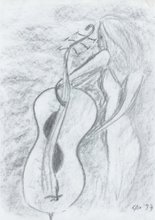
"Literary History and the present are dark with silences: some the silences for years by our acknowledged great; some silences hidden; some ceasing to publish after one work appears; some never coming to book form at all.
"These are not natural silences, that necessary time for renewal, lying fallow, gestation, in the natural cycle of creation. The silences I speak of here are unnatural; the unnatural thwarting of what struggles to come into being, but cannot. In the old, the obvious parallels: when the seed strikes stone; the soil will not sustain; the spring is false; the time is drought or blight or infestation; the frost comes premature." Tillie Olsen in Silences
And so I sit here, contemplating my own silences. Not the silences that mean I can't write anything, but the silences that prevent me from writing my novel, or that try to, at least; the nagging doubts that pick at my work with what can only be described as a very poor attitude; the lack of time and other commitments such as teaching, that sap my energy and leave me struggling to work late into the night; the self imposed distractions such as this blog, or the checking of endless email accounts; the words that flow so freely through my mind once my head has hit the pillow and yet flutter away just out of reach the moment I try to pin them down on the page. As though they are frightened of the light. And I have to ask myself, what am I frightened of? Of telling the truth? Of lying? Of getting it wrong? Or of getting it right?
The questions I return to readily is this; Why do I write at all if it is such a burden, a difficulty, a torture? Non-writing friends ask me why I even bother? But I think it is time to forget about answering that question because I write because I was born to write. Simple as that. If I write total crap, if the prose is stilted and lousy, then that is awful, dreadful, but I am condemned to spend my life producing it and then trying to make it better. I have no more a choice in whether to write or not, than I had of being born a female. And I wrote in the closet for years, until very recently in fact. Some people hide the fact that they drink, or raid the fridge at midnight. I hid the fact that I wrote everything down. Compulsively.
So - back to silences, and the reasons for these silences. Time is one of them. Virginia Woolf wrote about this. This need for space and time. This Room of One's Own. And I am blessed because I do have a room of my own to write in. But time is precious and difficult to come by.
Time. Time spent (willingly) with my children and my husband, and to feel guilty if I am writing. Time spent working; marking, planning, preparing, teaching. Tillie Olsen writes that she did not publish a book until she was 50, that "The years when I should have been writing, my hands and being were at other (inescapable) tasks into which most of my life went." (p.38) She talks about discontinuity as a "pattern still imposed upon women", and this makes me feel better because it is damned difficult to chase away the demons, to stare at the screen or page until something begins to emerge... tentatively, hesitantly... only to be called away to find a pair of socks, or cook the evening meal, or collect children from school, or to spy from the corner of my eye a batch of essays that needed marking yesterday.
But I am in good company. Katherine Mansfield wrote of her frustrations in the early days of her relationship with John Middleton Murray: they both wanted to be writers and yet she is running around keeping house while he works on his prose.(p.16) Franz Kafka speaks of writing late into the night because he is working in an insurance company. He speaks of long silences and breaks, saying "When I begin to write after such a long interval, I draw the words as if out of the empty air. If I capture one, then I have just this one alone, and all the toil must begin anew." (1912 Journal entry). Kafka also suffers from a lack of confidence also, writing in 1914; "Yesterday for the first time in months, an indisputable ability to do good work. And yet wrote only the first page. Again I realise that everything written down bit by bit rather than all at once in the course of the larger part is inferior, and that the circumstances of my life condemn me to this inferiority." (p.15) You see - the discontinuity principle is at work here. I feel this strongly every day. No chance to immerse fully, at length, to write until the writing is spent.
And so begin my thoughts on writers block for the conference paper. I wish the novel were as easy to write, that the muse would be so giving of itself for fiction, for the writing that truly matters and yet struggles so much to become.
I hope the rest of the novel racers are having an easier time of it because I would not wish the insecurities I feel in my own work on anyone!
UPDATE
As if to prove the point for interruptions, and discontinuities, my eldest has just come home and trotted into my office to tell me all about her evening with her friends... so much for the wonderful train of thought I'd been having!






























